|
|
|
Sort Order |
|
|
|
Items / Page
|
|
|
|
|
|
|
| Srl | Item |
| 1 |
ID:
149462
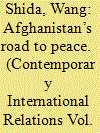

|
|
|
|
|
| Summary/Abstract |
After 15 years of war in Afghanistan since the US sent troops, the peace process seems to have little traction. As the war has worn on, the Afghan government, the United States and allies have failed to end the continuing Taliban insurgency that even as late as the October 2016 favored suicide bombers, road mines and the killing of civilians. When the Afghan government and Afghan Taliban held their first direct talks in 2015 with Pakistan’s mediation, there seemed hope of resolution but the death of Taliban leader Mullah Omarin July 2015 derailed the peace process. In the wake of the drone attack that killed his successor Mullah Akhtar Mansour, the Taliban has violently fought Afghan government troops. The mechanism formed in 2009 of China, the US, Pakistan and Afghanistan is trying to try to putpeace talks back on track and restore stability, but the attack on a shrine full of Shiite worshippers and numerous other Taliban attacks to retake parts of the country are the latest atrocities.
|
|
|
|
|
|
|
|
|
|
|
|
|
|
|
|
| 2 |
ID:
149456
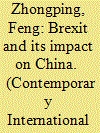

|
|
|
|
|
| Summary/Abstract |
The unexpected outcome of the Brexit referendum caught Britain, Europe and the world off guard. Despite the possibility that Britain might hinder the process via certain measures, we can now say that the Britain-EU divorce is inevitable. In the wake of the shock, people have reflected on how Brexit was able to happen and what will be the consequences. This paper seeks to explore these issues.
|
|
|
|
|
|
|
|
|
|
|
|
|
|
|
|
| 3 |
ID:
149458
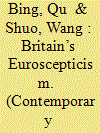

|
|
|
|
|
| Summary/Abstract |
Britain has voted to leave the European Union by 51.9% to 48.1% in June 2016. David Cameron announced his resignation following the vote for Brexit. Euroscepticism in the British public has been rising and political debates over how to handle Britain’s Relationship with the EU have also been intensifying. The numbers wanting a Brexit had been growing. With the EU trapped in a quagmire made of multiple crises, Britain’s referendum would be the same as rubbing salt into the wounds. A Brexit would not affect just Britain and the EU but it would have an effect on the entire world. Why did Britain opt out when it already enjoys a preferential status in the EU—it is outside the Eurozone and Schengen area? Why did the British public vote for Brexit when it was obvious that it would cause more harm than good? What was the underlying logic? This essay searches for the roots of Britain’s Eurosceptism by tracing back to post-World War II Britain-European relations and attempts to anticipate the possible impacts of the Brexit referendum.
|
|
|
|
|
|
|
|
|
|
|
|
|
|
|
|
| 4 |
ID:
149459


|
|
|
|
|
| Summary/Abstract |
The dilemmas for EU leader Germany may be partly due to its national character and historical experiences, but Germany is finding it difficult to adapt fast enough to threatened European Union fragmentation amid populist backlash on the home front. Brexit and the refugee crisis were only the most recent ingredients added to a European pressure cooker already suffering strain from economic quarters, from EU workers wearied by unemployment and financial insecurity, from an aging citizenry ready for pensioning, and a world not yet recovered from the debt crisis. Now that the political scene is experiencing the gravitational pull of a rightist, potentially xenophobic contingent, Germany will be making hard choices as it seeks to continue its leadership in Europe. Since 2008, unlike the German economy which continues to thrive, EU countries of the south fell into debt, and Germany has subsequently encountered many challenges to European integration. Germany has strength. But what lies behind its dilemmas, and can it continue to shoulder responsibility for leading the EU?
|
|
|
|
|
|
|
|
|
|
|
|
|
|
|
|
| 5 |
ID:
149463
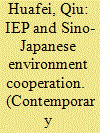

|
|
|
|
|
| Summary/Abstract |
As global environmental degradation continues to highlight the interdependence of nation states, Sino-Japanese environmental cooperation is certainly on the way. Deeper insight into environmental regimes shows that traditional methods of power politics, military power, or assigning blame in order to bargain competitively are often non-starters when both parties will suffer if goals remain unmet. A Global Environmental Mechanism is here proposed as new means for collective action by China and Japan, one that would enhance their bilateral environmental cooperation.
|
|
|
|
|
|
|
|
|
|
|
|
|
|
|
|
| 6 |
ID:
149457
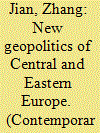

|
|
|
|
|
| Summary/Abstract |
Central and Eastern Europe is located between the East and the West. Big powers have traditionally competed for influence in the region and limited independence. After the Cold War, most of Central and Eastern Europe joined the EU and NATO and focused on political and economic transformations. Mostly these processes went smoothly and the region lost the world’s attention. However, in recent years, as Eurasian geopolitics has changed, especially after the outbreak of the Ukrainian Crisis, competition in the region has grown more intense. This situation is partly due to the region’s geography, history and development, which have traditionally made them targets for other powers to divide between them or to court favor. However, countries in the region no longer want to be puppets, they want to wrest control of their own destiny by playing the powers off against each other, so the geopolitical situation is now presenting a new picture.
|
|
|
|
|
|
|
|
|
|
|
|
|
|
|
|
| 7 |
ID:
149460


|
|
|
|
|
| Summary/Abstract |
As he approaches the end of his presidency, Barack Obama, who successfully handled thaws in US-Myanmar and US-Cuba relations, facilitated the signing of a nuclear deal with Iran and promised to“offer an outstretched hand”to enemy states, made no breakthroughs in North Korea. North Korea policy, rather, entered a deadlock. The North Korean nuclear problem has become“one of the most vexing and persistent problems in US foreign policy post Cold War”. Obama’s long-held strategic patience approach has worsened the situation. There is little chance that Obama will change this policy in the short time left of his presidency, so this paper has attempted a deeper analysis into strategic patience in order to better understand US’North Korea policy and to provide reference for China’s own North Korea policy.
|
|
|
|
|
|
|
|
|
|
|
|
|
|
|
|
| 8 |
ID:
149461


|
|
|
|
|
| Summary/Abstract |
In need of a friend to confront the Soviet Union, the United States turned a blind eye to Chinese political and social systems during the time of the Cold War, and the two became de facto allies, a perfect example for the traditional realist argument. The Carter Administration, critical of the Soviets’human rights situation, said little about China’s quite similar political system. The tune changed, however, shortly after the Cold War ended when China’s help was no longer needed and a rising China was thought to put the US in peril. “China Threat”was written in instead, and the theory became a bestseller. To counter, the US began supporting the theme of introducing democracy to rid China of its CPC leadership through peaceful means. Though the 9/11 tragedy delayed implementation, the partial end of the anti-terrorist war reinvigorated the idea. With a sophisticated design, mobilization of multiple forces, and push in all directions, the US masterplan turned out to be a major distraction for China. While immersed in managing economic development, Chinese leadership was forced to allocate huge resources to fend off these US attacks and maintain social stability. An analysis finds the activity to export democracy to China is being done by various entities including the White House, US Congress, non-governmental agencies especially the National Endowment for Democracy (NED), think tanks, universities, the media and religious organizations. Each performs unique functions.
|
|
|
|
|
|
|
|
|
|
|
|
|
|
|
|
|
|
|
|
|